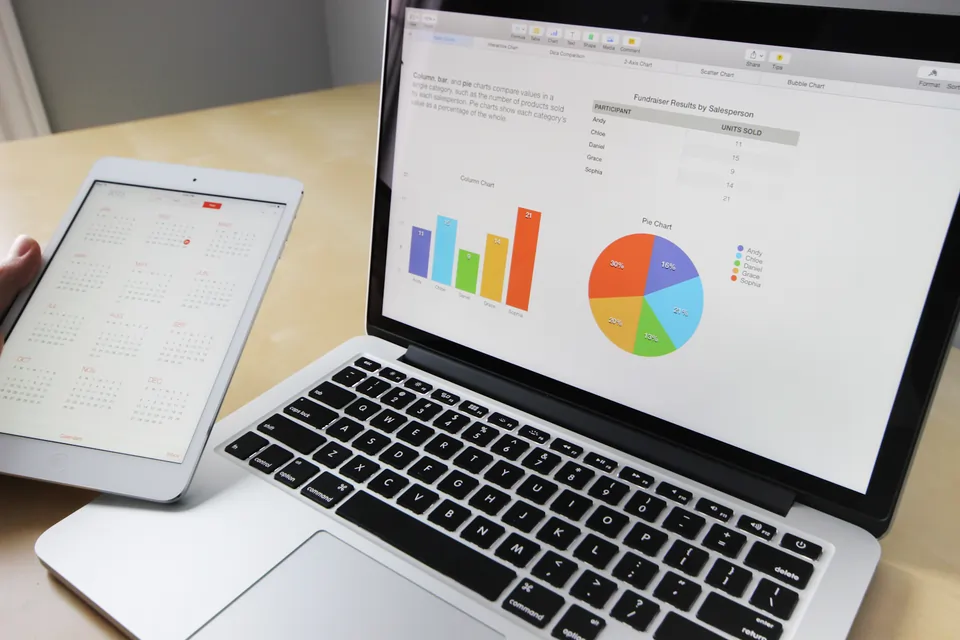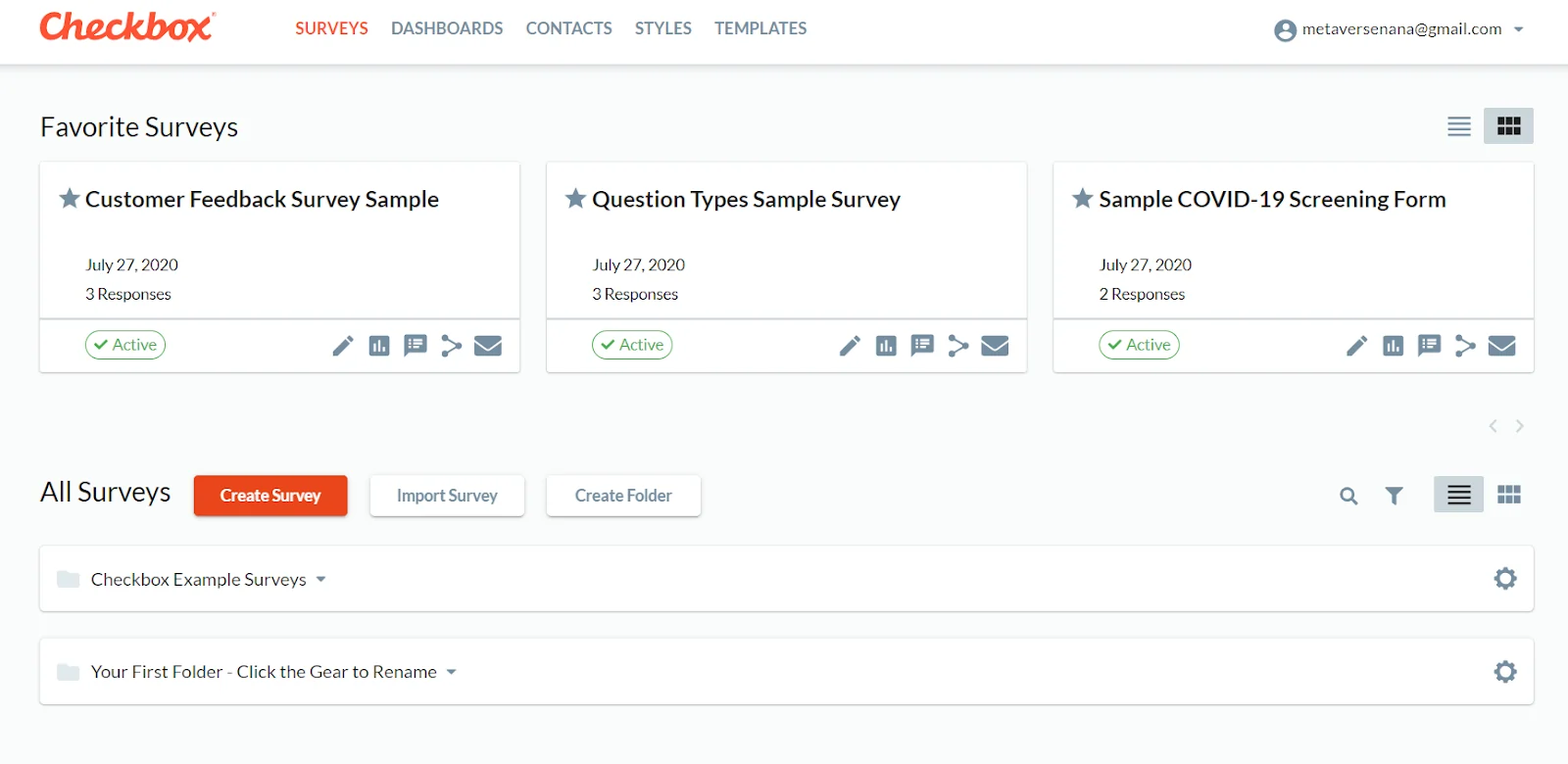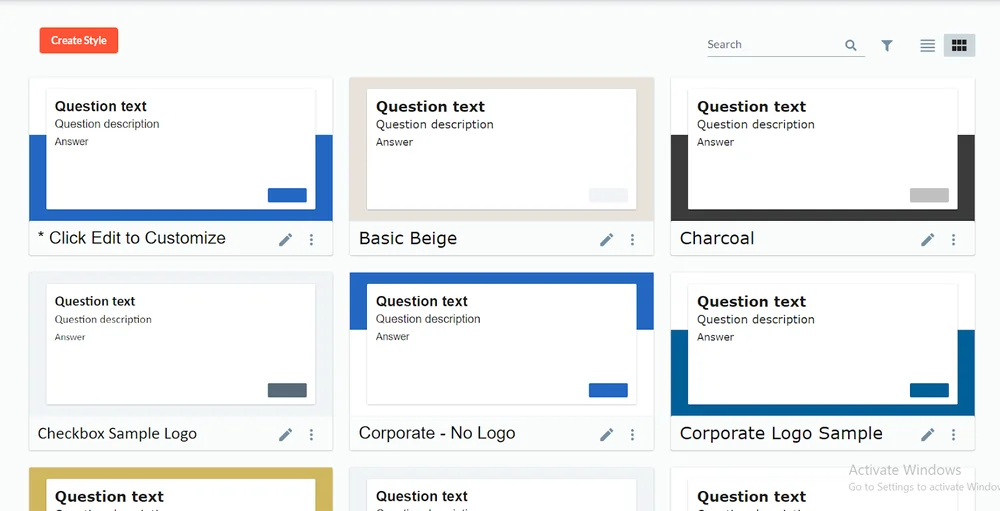The 10 Most Important Types of Employee Surveys and Which One to Use + Free Templates
If you’re curious to learn how you can better understand your employees you may be considering conducting an employee survey to gather their opinions, concerns, and feedback. However, with so many employee surveys out there you may be wondering where the best place is to start.
Well, in this article, we’re here to help. In this extensive piece, we’ll be diving into the details of the main types of employee surveys so that you can implement the survey or surveys that will collect the data you need. For each one, we’ll be outlining the benefits to you and your employees, providing sample questions, and linking you to a relevant template so you can get started with your own survey straight away.
From 360° employee surveys to employee onboarding surveys and everything in between, by the end of this article you’ll be an expert on how employee surveys work and which ones to conduct in your company.
Types of Employee Surveys: A Comprehensive Overview
Employee surveys play a vital role in understanding and improving various aspects of organizational dynamics. Here's a quick overview of some key employee surveys discussed in our blog post:
- 360-Degree Survey
- Company Culture Survey
- Employee Engagement Survey
- Employee Opinion Survey
- Employee Satisfaction Survey
- Employee Benefits Survey
- Employee Feedback Surveys
- Employee Performance Survey
- Employee Pulse Survey
- Employee Onboarding Survey
Each survey type offers unique insights into your organization's dynamics and empowers you to make data-driven decisions. Learn how to leverage these surveys effectively to drive employee engagement and foster a positive work culture.
Keep reading this comprehensive guide on Employee Surveys for detailed insights and actionable strategies.
What are employee surveys?

An employee survey is a useful assessment tool used by companies and organizations to gather feedback, insights, opinions, and information from their employees. Taking the form of a questionnaire, online form, or in-person interview, this kind of survey typically seeks to cover topics related to the employee experience within the company, such as workplace culture, employee relations, employee morale, task management, and leadership.
Employee surveys can have multiple purposes depending on the particular set of data that a company is hoping to collect. These purposes can range from measuring employee satisfaction and identifying workplace issues to gauging effective leadership and fostering open communication.
Benefits of employee surveys
There are numerous advantages to both employees and organizations when employee surveys are conducted regularly in the workplace. The biggest advantage is perhaps the valuable feedback and insights an employee survey incites from participants which can range from opinions, concerns, and suggestions, to offering feedback on ongoing issues.
An employee survey is also valuable for identifying workplace challenges. A survey will help you pinpoint areas of concern for employees, in doing so enabling management to address significant issues before they escalate or spread.
An employee survey is a valuable tool for improving workplace communication. This is because a survey encourages employees to be transparent about their feelings towards their jobs, their workloads, and their professional relationships. This makes them feel heard and valued, and this positive validation leads them to be more open in their communication and feedback generally.
Studies show that employees become more engaged when they feel like their opinions matter. Asking for their participation in an employee survey is therefore a great way for a company to demonstrate that it wants to know how its employees feel about coming to work and in doing so makes employees feel like their opinions really matter.
The targeted improvements which result from the data and opinions collected in an employee survey boost the job satisfaction levels of every employee. Not only are their issues being addressed, this also demonstrates that their concerns have been taken seriously and acted upon.
With the results of a survey, a company is well-placed to make data-driven decisions. False steps are therefore less likely to occur and an organization is no longer reliant on assumptions or hearsay.
By performing surveys on a regular basis, a company is able to track, measure and compare data over time, and, in doing so, can accurately assess the impact and effectiveness of implemented changes.
Due to the positive work culture that is fostered when a company actively seeks the opinions and feedback of its employees, staff retention is considerably higher than in companies that do not engage with their employees. In addition, attracting talent is easier, due to the positive reputation a company builds when it engages with its employees in this way.
Are employee surveys effective?
Not all employee surveys are effective because they are done wrongly. To make your employee surveys effective, you should
- Have a goal
- Ask the right questions
- Leverage different response options
- Encourage anonymous surveys
- Keep your survey simple and short
- Leverage survey software like Checkbox
- Act on survey feedback
Different types of employee surveys
There are a range of different employee surveys you might want to consider conducting within your organization. In order to choose which one is right for you, you’ll need to consider your goals for the survey. Are you looking to gain insights into how your employees feel about the company culture? Or are you looking to learn how your benefits package might better meet the needs or preferences of the team? Once you’ve defined the goals of your survey, you’ll be well positioned to select the right survey and gather the crucial insights, feedback, and data you need to implement positive and long lasting changes within your organization.
Which employee survey is right for you?
Let’s dive into the different types of employee surveys you can conduct so you can assess which survey might be the most appropriate for you and your employees.
1. 360-degree survey

A 360-degree survey is an evaluation tool used by companies for gathering feedback from a range of sources that is then used to inform a performance evaluation of one individual at a company. The idea behind this type of survey is that it includes feedback from a range of perspectives, including the individual themselves, to provide a complete picture of their professional contribution to an organization.
Benefits of 360-degree surveys
A 360-degree survey offers numerous benefits to both employees and company leaders. Let’s take a look at some of the key ones.
- They enable team leads to gain a holistic understanding of an individual’s strengths, weaknesses, and areas for improvement
- They promote a self-aware approach as they highlight areas for improvement that an individual may not know of themselves
- They provide personal development opportunities by identifying weak areas, encouraging open communication, and fostering both teamwork and individual performance
- By providing such comprehensive results, a 360-degree survey enables team leaders and mentors to develop tailored personal development plans for each employee
Why are 360-degree surveys important
A 360-degree survey provides significant value as it offers a multi-dimensional view of an individual’s professional performance. As well as encouraging self-reflection, the tool boosts communication and fosters a working culture that places value on every aspect of performance.
Sample 360-degree feedback questions
Let’s take a look at some sample questions from a 360-degree survey:
- How effectively does the individual convey complex ideas and information in a clear and understandable manner?
- To what extent does the individual demonstrate the ability to motivate and inspire others toward achieving common goals?
- How well does the individual collaborate with team members, sharing knowledge and fostering a positive team environment?

2. Company culture surveys

A company's culture greatly influences employee engagement and increases job satisfaction by 42%. It can also impact a company's
- Sales
- Reputation
- Recruiting efforts, etc
A company culture survey is an assessment tool used by organizations to better understand their employees’ behaviors, beliefs, values, and cultural norms. Questions on this type of survey will typically address work-life balance, inclusivity, diversity, equity, leadership style, and communication. The goal of the company culture survey is to provide insights into the current company culture and help to identify areas that could be improved or cultural elements that could be reinforced.
Benefits of company culture surveys
Company culture surveys are advantageous for both team members and company heads alike. Let’s dive into the benefits of this kind of survey.
- They enable management to gauge employee satisfaction and engagement in the workplace
- They help team leaders assess how aligned the company is with its employees’ values and goals
- They offer valuable insights into the overall health of the working environment
- They pinpoint areas that are succeeding with a positive workplace culture and areas which could be improved or more aligned with employees
- They foster a more positive and supportive work culture as employees feel their values are being taken into account
- Data assists in the making of data-driven decisions regarding company culture
Why are company culture surveys important
A company culture survey is a great way to measure the prevailing attitudes, values, and behaviors within a company. It also provides the data needed to support decision making, changes, and improvements related to a company’s mission statement, ensuring that this statement of intent aligns with the company’s most valuable asset: its employees.
Sample company culture survey questions
Below are three sample questions that you might find on a company culture survey:
- On a scale from 1 to 5, how motivated do you feel to contribute to the company's success and mission?
- Do you believe that diversity is respected and valued within our organization? Please share examples that support your opinion.
- How transparent and effective do you find the communication from senior leadership regarding company goals, changes, and decisions?
If you want to go the statement route, below are just a few examples of statements you could make, then have a response scale from "Strongly agree" to "strongly disagree."
- I am rewarded for great work
- My voice is heard at this company
- I feel valued and appreciated
- My managers and supervisors treat me with respect
- I have the resources I need for my career development
- I can share my thoughts comfortably with my team members and leaders
3. Employee engagement survey

Employee engagement is vital for the company's growth and employees' well-being. According to the "State of the Global Workplace 2022 Report" by Gallup, companies with engaged employees record 23% higher profits than those with disengaged employees, and 95% of employees thriving at work say they are treated with respect.
An employee engagement survey is a data collection methodology used by companies to assess and review how committed, enthusiastic, and motivated its employees are towards their workplace activities and towards the company as a whole. This kind of survey can support companies in better understanding the different factors which increase employee engagement as well as identify and address any issues that may be hindering it.
Additionally, employee engagement
- Boosts employee loyalty
- Helps maintain high employee retention
- Increases customer service and satisfaction
- Fosters employee satisfaction
- Boosts employee productivity
- Reduces employee absenteeism
With regular surveys, you can see how well you are keeping your employees engaged.
Benefits of employee engagement surveys
Employee engagement surveys are a tool that provide numerous benefits to individuals, teams, and management. Let’s take a look at some of the main ones here.
- They provide insights into the motivation and satisfaction of employees
- The results help employers identify potential issues with employee morale and enthusiasm that, when addressed, improve engagement and the employee experience overall. (Find here a template for employee experience surveys)
- They foster a culture of open communication, feedback, and trust
- They highlight areas for improvement that could boost employee engagement
- They demonstrate the company’s commitment to the well-being of each employee
- They help employees feel like their voices, opinions, and issues are being listened to and addressed
Why are employee engagement surveys important
An employee engagement survey is a practical tool for companies seeking to gauge the satisfaction, motivation, and attitudes of employees while also highlighting a firm’s areas of strength and weakness in regard to employee engagement. With the data collected, an organization can implement the crucial changes needed to boost overall morale and engagement, encourage communication, and foster a positive working culture. When conducted regularly over a longer period, these surveys contribute significantly to a more engaged workforce as well as demonstrate to employees the company’s commitment to each individual’s sense of well-being and job satisfaction
Employee engagement survey questions to consider
Below are three questions you might find on a typical employee engagement survey:
- On a scale of 1 to 5, how motivated are you to contribute to the company's goals and vision?
- Do you feel that your opinions and suggestions are valued and considered by the management?
- How likely are you to recommend this organization as a great place to work to friends or colleagues?
Some additional questions you can get insights into how engaged your employees feel:
- Do you feel empowered at work?
- Do you feel recognized for your input?
- Do you feel driven to help the organization succeed?
- Does the company allow you to learn and develop your skills?
- Do you have confidence in the organization's leadership?
- Do you feel the organization has your best interests?
- Do you have the resources and guidance you need to succeed in your job?
Free employee engagement survey template
Have a look here for our employee engagement survey template and create your survey directly in Checkbox.
4. Employee opinion survey

Used by companies and in-house teams, an employee opinion survey is a series of questions asked of employees to gather anonymous feedback related to aspects of the workplace, job roles, relationships with team members, management, and career progression. The survey gathers valuable insights and statistical data that organizations can use to better understand the workforce, pinpoint areas for improvement, and inform decision making.
An employee opinion survey helps you understand their perception of the workplace and different aspects of the company.
You could get opinions from your employees about how to solve a company's problem or how they feel about a situation in the company. You never know how helpful ideas or suggestions from your employees can give you perspectives you probably would have needed to consider.
Getting feedback from your employees also makes them feel like their opinions count, and we can agree that valued employees are more invested in the company's growth and success.
Benefits of an employee opinion survey
A company or team can reap numerous advantages from conducting an employee opinion survey. Let’s dive into some of them.
- They support management in better understand the thoughts and perspectives of employees regarding the workplace and the company
- They provide a safe space for anonymous feedback
- They provide data which reveals important trends in opinions
- Anecdotal evidence provides valuable context to statistical trends and observations
- They can boost employee morale and retention as they show the company seriously values its employees’ opinions and feedback
- They can be a catalyst for the implementation of positive employee-led changes in the workplace
Why are employee opinion surveys important
Employee opinion surveys aren’t just a collection point for opinions and feedback; they offer company leaders crucial insights into the overall health of an organization from those who know it inside out. When openness and transparency are actively encouraged in this way, important changes and decisions which improve employee satisfaction become more targeted and are therefore considerably more effective.
What are sample employee opinion survey questions
Let’s take a look at three key questions that you might see on an employee opinion survey:
- On a scale from 1 to 5, how satisfied are you with the opportunities for professional growth and development within the company?
- Do you feel your direct supervisor or manager effectively communicates expectations and provides support for your day-to-day tasks?
- How well do you believe the company values diversity and inclusion in its policies and practices?
5. Employee satisfaction survey

According to statistics, unhappy employees reduce profitability by 15% and productivity by 18%, resulting in an annual loss of about $550 billion for U.S. companies. With employee satisfaction surveys, you can identify how many employees are pleased, disgruntled, passionate or barely satisfied with their jobs and get feedback on how to make them happy.
Usually structured as a questionnaire or in-person assessment, an employee satisfaction survey aims to assess contentment levels of employees within a company or organization. It does this by posing a number of questions related to various elements of the working environment, the nature of tasks, and the overall company culture.
As the name implies, an employee satisfaction survey, often referred to as job satisfaction, survey measures employees' contentment levels toward their jobs and the company.
Satisfied employees feel thrilled about their jobs and value them highly. Several factors could influence employee satisfaction, including
- Income
- Recognition and appreciation
- Workplace culture
- Work benefits, bonuses or wellness programs
- Work flexibility
- Motivation
- Career development opportunities
- Work-life balance, etc.
Benefits of employee satisfaction surveys
Different types of firms, organizations, and establishments can benefit hugely from such a survey. Here are some of the key benefits:
- They pinpoint areas for improvement by identifying what is causing dissatisfaction among staff members
- They boosts retention levels as companies are well-placed to address relevant concerns and issues
- They enhance employee morale as employees feel their well-being is valued to the company. This in turn boosts productivity and engagement
- They guide decision making as leaders can access this data to see what to prioritize
- They highlight progress and positive changes that can be used to promote the company and attract top talent
- By demonstrating a commitment to employee well-being, these surveys make employees feel more loyal to a company
Why are employee satisfaction surveys important
An employee satisfaction survey is important because it provides a structured method for companies seeking to assess the contentment, concerns, and general well-being of its employees. With access to this data, feedback, and insights, a company is in a powerful position to make significant improvements to its processes, culture, and interpersonal relationships that in turn boosts team productivity and morale and enhances the reputation of the company as a whole.
Employee satisfaction survey questions to consider
If you're considering performing an employee satisfaction survey, you may wish to use questions which are in line with the following:
- On a scale of 1 to 5, how satisfied are you with the opportunities for career growth and development within the company?
- Do you feel that your compensation and benefits package fairly reflect your contributions and efforts to the company?
- How supported do you feel in maintaining a healthy work-life balance within this company?
Employee satisfaction surveys are usually done with a rating scale while still providing an outlet for them to give their written feedback, depending on your goal for the survey.
You can determine your employee satisfaction level with these additional questions.
- Do you find your role stressful?
- How satisfied are you with your position?
- Do you feel respected?
- Do you enjoy your job?
- How likely are you to search for another job?
- Does your pay reflect the work you do?
- Are you satisfied with the perks and bonuses you receive for your role?
- Does the workplace culture align with your values?
- Does your role give room for career growth?
- Do you have a healthy work-life balance?
- How well do you relate with your managers and team members?
- Are you provided the resources you need to perform well in your role?
Free employee satisfaction survey template
To set up a survey for your company, click here for a free employee satisfaction survey template in Checkbox.
6. Employee benefits survey
For companies which wish to measure the satisfaction and preferences of its employees in regard to their benefits packages, the employee benefits survey is the ideal tool. Covering all benefits-related topics, including healthcare packages, pensions, wellness packages, holiday pay, and more, the survey is designed to offer employer’s a clearer understanding of how employees perceive their benefits, and help them identify areas for change or improvement.
Benefits of employee benefits surveys
Here’s a rundown of the advantages that an employee benefits survey can offer companies and organizations:
- They help shine a light on how effective and relevant the company’s current benefits offerings are to its employees
- They demonstrate the employer’s commitment to providing benefits packages that the workforce genuinely value
- Insights can help inform changes and improvements to new benefits offerings
- With the results, benefits programs can be more effectively tailored to meet the needs of the workforce, increasing employee satisfaction
- Data-driven decision-making leads to the creation of benefits packages that attract and retain top talent
Why are employee benefits surveys important
The value and significance of an employee benefits survey lies in its ability to seamlessly enable companies to better understand how effective and valuable their benefits offerings are. It does this by opening up communication on the topic with employees directly which assists in providing a broader comprehension of team member perspectives by those in management.
Employee benefits survey questions to consider
Below are some questions that you might find on a typical employee benefits survey or questionnaire.
- How satisfied are you with the current healthcare benefits provided by the company, including coverage, access to healthcare providers, and overall ease of use
- On a scale of 1 to 5, how valuable do you consider the retirement plans and savings options offered by the company?
- Do you feel that the wellness programs provided effectively support your health and well-being needs, such as fitness, mental health, and stress management?
Free employee benefits survey template
To set up a survey for your company, click here for a free employee benefits survey template in Checkbox.
7. Employee feedback surveys

In a similar vein to some of the other surveys we’ve outlined in this article, an employee feedback survey is a set of questions designed to garner the opinions, behaviors, and preferences of employees by the company they work for. The questions in this kind of survey seek to elicit honest, anonymous feedback from team members that managers can use to better understand and address work-related concerns.
Benefits of employee feedback surveys
Some of the main benefits of an employee feedback survey include the following:
- They foster an environment of open communication and constructive feedback between management and employees
- They boost employee engagement by demonstrating the value placed on each employee’s feedback and opinions
- They assist management in identifying areas of the employee experience that could be improved, leading to targeted and data-driven prioritization
- They increase job satisfaction among employees as relevant concerns are addressed
- They promote a positive workplace culture by enabling management to act on employee feedback which demonstrates the company commitment to enhancing individual well-being
Why are employee feedback surveys important
An employee feedback survey provides a direct channel between employees and management which can be used by employees to air their views, concerns, and suggestions. As well as offering valuable insights that help a company better understand employee sentiments and concerns, this kind of survey promotes a positive culture of open communication that leads to higher engagement and enhanced productivity.
Employee feedback survey questions to consider
Here are three sample questions that you may wish to include in your employee feedback survey:
- How satisfied are you with the communication channels within the organization for sharing ideas and concerns?
- Do you feel that the company effectively recognizes and rewards employee contributions and achievements?
- On a scale of 1 to 5, how supported do you feel in terms of professional growth and development opportunities provided by the company?
8. Employee performance surveys
An organization or management team that seeks to evaluate an individuals’ work performance and contributions can do so by conducting an employee performance survey. With a range of multiple choice, open, and closed questions, the survey is typically designed to measure various aspects of one employee’s work and approach, including their strengths and weaknesses, team contributions, task management, and general productivity.
Benefits of employee feedback surveys
The key benefits of conducting a work performance survey are as follows:
- They provide useful insights into an individual’s strengths, weaknesses, job satisfaction, and general performance in the workplace
- By assessing employees across one organization using the same survey, an objective and transparent review process is established
- They provide each employee with an opportunity to give their own feedback on how they feel their own journey with a company is going which allows them to feel heard and seen
- With areas for improvement identified, employees and managers can work together to enhance an individual’s performance while ensuring a general positive experience for all
Why are employee performance surveys important
By assessing an employee’s performance using an employee performance survey, team leads have a handy tool for gathering highly-specific feedback on employees’ unique contributions, strengths, and areas to work on. This data enables those in management positions to more easily put together a holistic and comprehensive evaluation of each employee’s work and role within the company, while simultaneously fostering a culture of professional development that seeks to align individual performance with company goals.
Employee performance survey questions to consider
Here are some sample questions for you to consider for your own employee performance survey:
- How well do you feel your goals and expectations were communicated and aligned with your role and responsibilities?
- On a scale of 1 to 5, how effectively do you believe your performance is evaluated and acknowledged by your manager or supervisor?
- Do you feel adequately supported with resources and training to perform your job at the expected level?
9. Employee pulse surveys

Designed with speed in mind, an employee pulse survey is a short questionnaire distributed at regular intervals among employees that seeks to gauge how employees are feeling at a company or organization. With the goal of swiftly capturing the general workforce’s views related to pressing topics or trends, the feedback and insights of the pulse survey provides close to real-time feedback and insights that can assist management and HR teams with prioritization and decision making.
Benefits of employee pulse surveys
The benefits of conducting an employee pulse survey are wide ranging. Here are some of the main reasons why they are popular:
- They provide immediate feedback into the concerns of the workforce
- Measuring attitudes in the workplace swiftly and regularly enables management to quickly react to pressing concerns before they escalate
- They foster a culture of ongoing communication in the workplace
- They promote a responsive and agile culture within the workplace which demonstrates to employees that their concerns are not only taken seriously, but also acted upon at speed
Why are employee pulse surveys important
An employee pulse survey provides a valuable service to companies as it offers real-time insights into the pressing concerns of employees that facilitates the swift intervention by management or HR teams. It also gives a management team an overview of general sentiments, dynamics, and attitudes within the company at crucial moments.
Employee pulse survey questions to consider
When putting together your employee pulse survey, you may wish to include the following questions:
- How motivated do you feel to perform your best work today?
- On a scale from 1 to 5, how connected do you feel to the company's mission and values?
- Do you feel your voice is heard and considered in decision-making processes within the organization?
10. Employee onboarding surveys

A tool used by HR teams for analysis and feedback, an employee onboarding survey gathers the opinions and experiences of new employees in relation to the onboarding process they went through when joining the company. The survey questions typically cover topics such as orientation, training, and role expectations, however it also provides room for the new employee to offer feedback on the onboarding process in general and how they feel it could have been done better.
Benefits of employee onboarding surveys
Let’s take a look at some of the key benefits of an employee onboarding survey.
- They provide a space for newcomers to offer insights into how onboarding processes might be improved
- Feedback from the survey enables HR teams to work on improvements to the process and make the experience for future hires more seamless and effective
- Employee onboarding surveys boost the retention of staff as they lead to legitimate employee concerns being addressed
- They help to set the groundwork for clear expectations on both sides: newcomers have a good understanding of what their roles and responsibilities are from day one
Why are employee onboarding surveys important
This type of survey provides HR teams with direct feedback from new additions to the company. This gives them the opportunity to get a fresh perspective on processes, ensure a smooth transition for future employees, and align employee expectations with those of the company. It also demonstrates from very early on the value the company places on continually learning and improving, which sets a positive tone for newcomers.
Employee onboarding survey questions to consider
The following questions are commonly seen on an employee onboarding survey:
- How effective was the onboarding process in providing a clear understanding of your role and responsibilities within the company?
- On a scale from 1 to 5, how well did the onboarding process introduce you to the company culture and values?
- Did the onboarding process sufficiently equip you with the necessary resources and training to start your role confidently and effectively?
Creating an employee survey with Checkbox

Founded in 2002, Checkbox is a professional survey tool that helps you create fun customer and employee surveys seamlessly. Checkbox offers excellent features that help you increase your survey response rates.
Not only does Checkbox allow you to create and customize mobile-friendly surveys, but it also gives you real-time reports and analytics so you will retain essential data. Sharing surveys has never been easier; you can efficiently distribute your surveys through custom links, QR codes, social media platforms or email/SMS campaigns.

Our tool makes surveys enjoyable for your customers and employees, as it offers various templates that allow you to gather data in different ways based on the preferences of your employees or customers, including
- Radio buttons
- Multichoice options
- Rating scale
- Multi text boxes
- Single line responses
- Emojis, etc
Additionally, your respondents can upload files to answer specific questions.

Checkbox offers you many helpful features, such as
- Custom branding
- Email and SMS invitations
- Automation and third-party integrations
- Best-in-class security
- Mobile responsiveness
- Reporting and analytics
- Easy exporting and sharing, etc
You can access Checkbox using our cloud-hosted subscription that doesn't require installation or leveraging our on-premise employee feedback software, which you have to install on your servers or private cloud.
Whether you choose the SaaS or On-Premise software, you still get value and have access to our many features. Both plans offer affordable pricing plans.

Creating an employee survey with Checkbox is easy; all you need do is to
- Select a survey template, build from scratch or import an existing survey
- Customize your survey style and info
- Add and customize your survey questions

1. Export or distribute surveys
2. Monitor responses and receive timely reports
Checkbox is easy to use and over 2500 professionals from various industries use Checkbox globally to make their surveys fun and effective.
Conclusion
We have explained an employee survey and highlighted the different types you can use for your company, but it doesn't just end there. Most employees ignore surveys because they feel organizations don't act on them or improve employee satisfaction. To make your employee survey effective, you must also act on your survey responses to encourage employees to participate in subsequent ones.
To get started with your first employee survey, simply request your Checkbox demo.


Contact us
Fill out this form and our team will respond to connect.
If you are a current Checkbox customer in need of support, please email us at support@checkbox.com for assistance.


